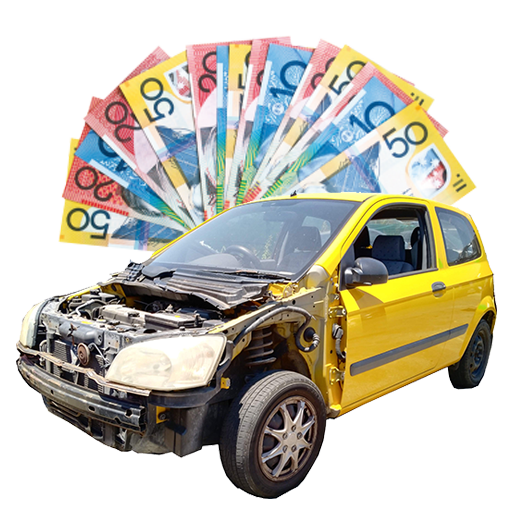Figuring out what to do with that old car sitting in your driveway can be a real headache. Is it even worth anything? Is it just a pile of scrap? Selling it to a car wrecker is often the fastest and easiest way to turn that old clunker into cash, especially if it’s no longer roadworthy.
Is Selling to a Wrecker Your Best Move?
Let's be honest, not every car is a candidate for a private sale or a dealership trade-in. Sometimes, the most practical and profitable move is to sell it straight to a wrecker. This is especially true in a few common scenarios where trying to sell it any other way just doesn't add up.
When Wreckers Are the Smart Choice
You'll know it's time to call a wrecker when you find yourself in one of these situations:
- Sky-High Repair Costs: The mechanic’s quote is more than the car is actually worth. At that point, you're better off selling it for its parts and scrap metal value than pouring more money into a losing battle.
- Written-Off by Insurance: If your insurer has declared the car a total loss, a wrecker can still give you a decent price for the salvageable components and the remaining metal. It's a great way to recover some extra cash.
- No Rego, No WOF, No Worries: A car that's unregistered and failing inspections is just taking up space. Wreckers will happily buy it as-is, which saves you the time, money, and stress of trying to get it road-legal again.
This decision tree breaks down the common reasons people end up choosing a wrecker.
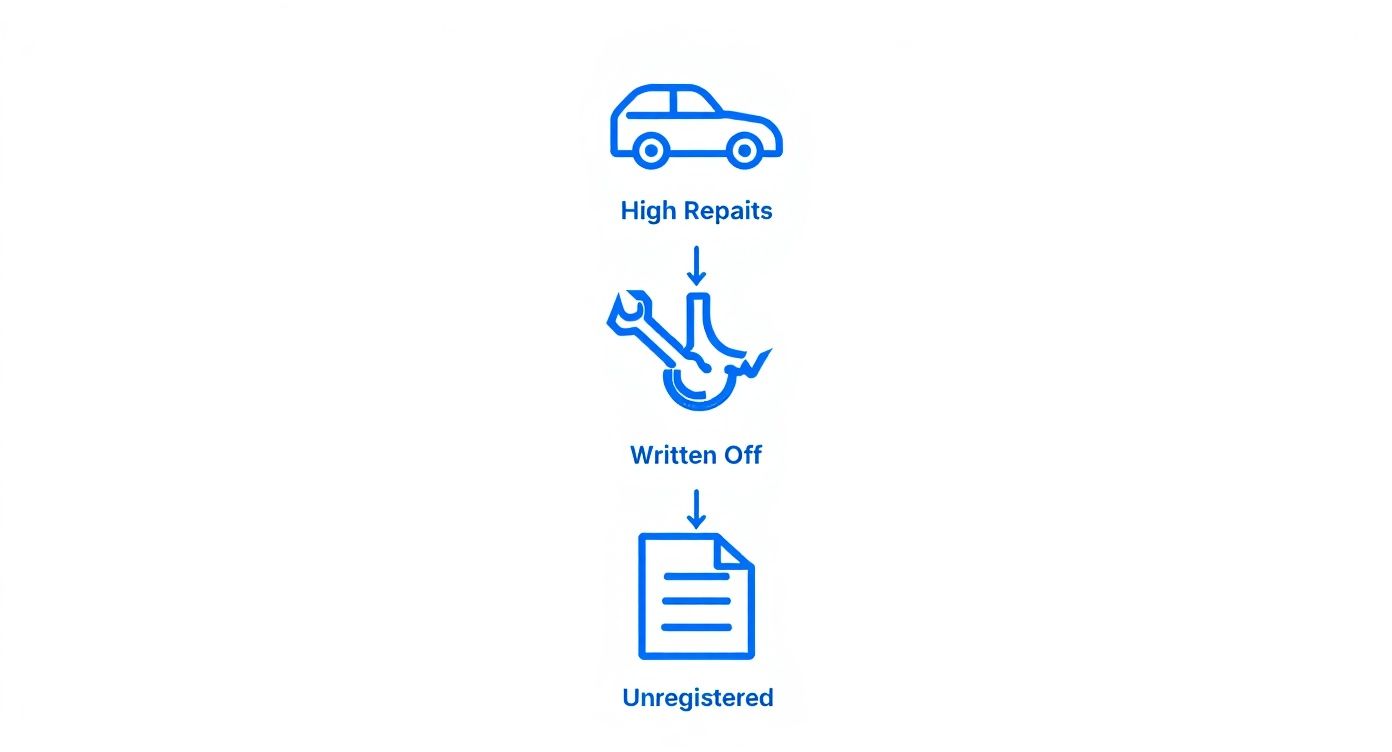
As you can see, major repair bills, insurance write-offs, and registration problems are the main drivers behind this decision.
Here's the bottom line: if the time, money, and hassle of selling your car privately outweigh what you’d get for it, a wrecker offers instant cash with zero fuss.
It's a surprisingly robust industry, too. The used auto parts market in Australia is worth around $1.3 billion, largely driven by independent wreckers ready to take that vehicle off your hands. It's all about making an informed decision, and our guide on the proper disposal of cars can provide even more insight.
Comparing Your Car Selling Options
To put it all in perspective, here's a quick look at how selling to a wrecker stacks up against other options.
| Selling Method | Best For | Speed | Payout | Effort Required |
|---|---|---|---|---|
| Private Sale | Well-maintained, roadworthy cars | Slow (weeks to months) | High | High |
| Dealership Trade-In | Newer models in good condition | Fast | Low to Medium | Low |
| Selling to a Wrecker | Old, damaged, or unroadworthy cars | Very Fast (often same-day) | Low to Medium | Very Low |
Ultimately, choosing a wrecker is about efficiency. You're trading a potentially higher payout from a private sale for a guaranteed, quick, and hassle-free transaction. For many car owners, that trade-off is well worth it.
Getting Your Car Ready for Pick-Up
Right, so you've locked in a great offer. What happens next? A little bit of prep work on your end will make the actual pick-up day completely painless. It's not just about tidying up; it's about protecting your privacy and making sure the handover with the tow truck driver is quick and easy.
First things first, you need to go on a treasure hunt for your personal belongings. You’d be shocked at what we find left in cars – everything from spare change and old sunnies to important documents. Once that car is on its way to the yard, getting those items back is next to impossible.
The Ultimate "Empty Your Car" Checklist
Before that tow truck is scheduled to show up, give these spots a final, thorough check:
- Glove Box & Centre Console: This is the obvious one, but double-check for old rego papers, service receipts, or even a forgotten pair of headphones.
- Under the Seats: This is a classic hiding spot. Slide those seats all the way forward and back to catch anything that's rolled underneath.
- Boot & Spare Tyre Well: Lift up the boot floor. You might have a toolkit, jumper cables, or other items tucked away with the spare tyre.
- Door Pockets & Seatback Pockets: These are so easy to overlook but are magnets for small, personal items.
With the car completely cleared out, your next job is sorting out the paperwork. This is a crucial step – it's what officially separates you from the vehicle and protects you from any future issues. You'll need to cancel your registration and your insurance.
My Advice: When you cancel your registration in South Australia, you can often get a refund for the unused part of it. It's definitely worth contacting Service SA to see what you're entitled to. It's a nice little cash bonus.
Finally, think about any aftermarket parts you've added over the years. Got a top-of-the-line stereo system, fancy custom wheels, or a quality roof rack? You'll get far more money selling those privately than you will from a wrecker’s quote. Just be sure to swap them back with the original factory parts if you still have them laying around. This can seriously boost your total cash in hand from the whole process.
Getting the Best Cash Offer for Your Car
This is the part where a bit of legwork really pays off. Getting the best price from a wrecker isn't about luck; it's about being prepared and creating a little competition. Before you even think about picking up the phone, get your car's details in order.
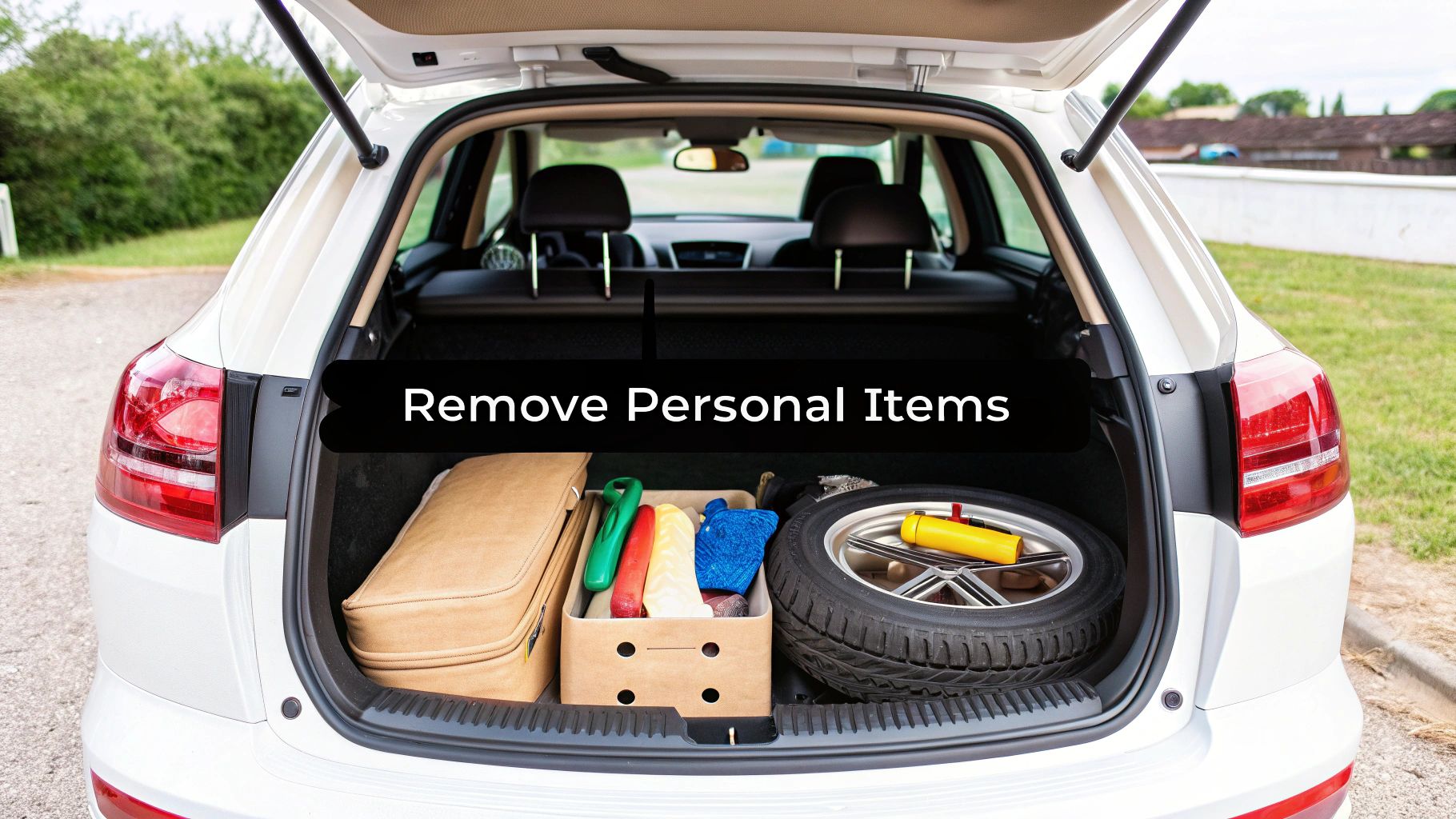
Any reputable wrecker will need specific info to give you a solid quote. Have this ready to go:
- Make, Model, and Year: The basics, of course.
- Vehicle Identification Number (VIN): This tells them the exact factory specs.
- An Honest Condition Report: Are there major parts missing, like the engine or gearbox? Is there significant body damage? Being upfront now prevents them from trying to knock down the price when they show up.
Once you've got your info sorted, don't just call the first wrecker you find. Ring at least three different local businesses. It’s a simple step, but it puts the pressure on them to offer a competitive price to earn your business.
Asking the Right Questions
When you’re on the phone, the offer amount is only half the story. The fine print – or what they don't say – matters just as much. For a complete picture of how wreckers arrive at their price, our guide on how much auto wreckers pay for cars is a must-read.
Pro Tip: Always confirm if the price they've quoted includes free towing. Some shadier operators will give you a great-sounding number over the phone, only to show up and subtract a hefty towing fee, leaving you with way less cash in hand.
Remember, wreckers aren't just buying scrap metal. They're buying a collection of potentially valuable, reusable components, and understanding this gives you more negotiating power.
The most valuable parts are almost always the big-ticket items that are expensive to replace new. In Australia, with new car and repair costs on the rise, the market for good second-hand engines and transmissions is booming. These two components are at the top of every wrecker's list and are the main drivers behind your car's valuation.
Other parts they’re always looking for include:
- Catalytic Converters: They contain precious metals that are highly valuable.
- Alternators and Starter Motors: These fail often and are common replacement jobs.
- Intact Body Panels: Doors, bonnets, and guards without major damage can be sold easily.
If you know your car's engine was running perfectly before it was parked, or the transmission is in good nick, mention it! Highlighting the condition of these in-demand parts can often give your initial quote a nice little bump and ensure you walk away with the best possible cash deal.
Finalising the Sale: Sorting Out the Paperwork
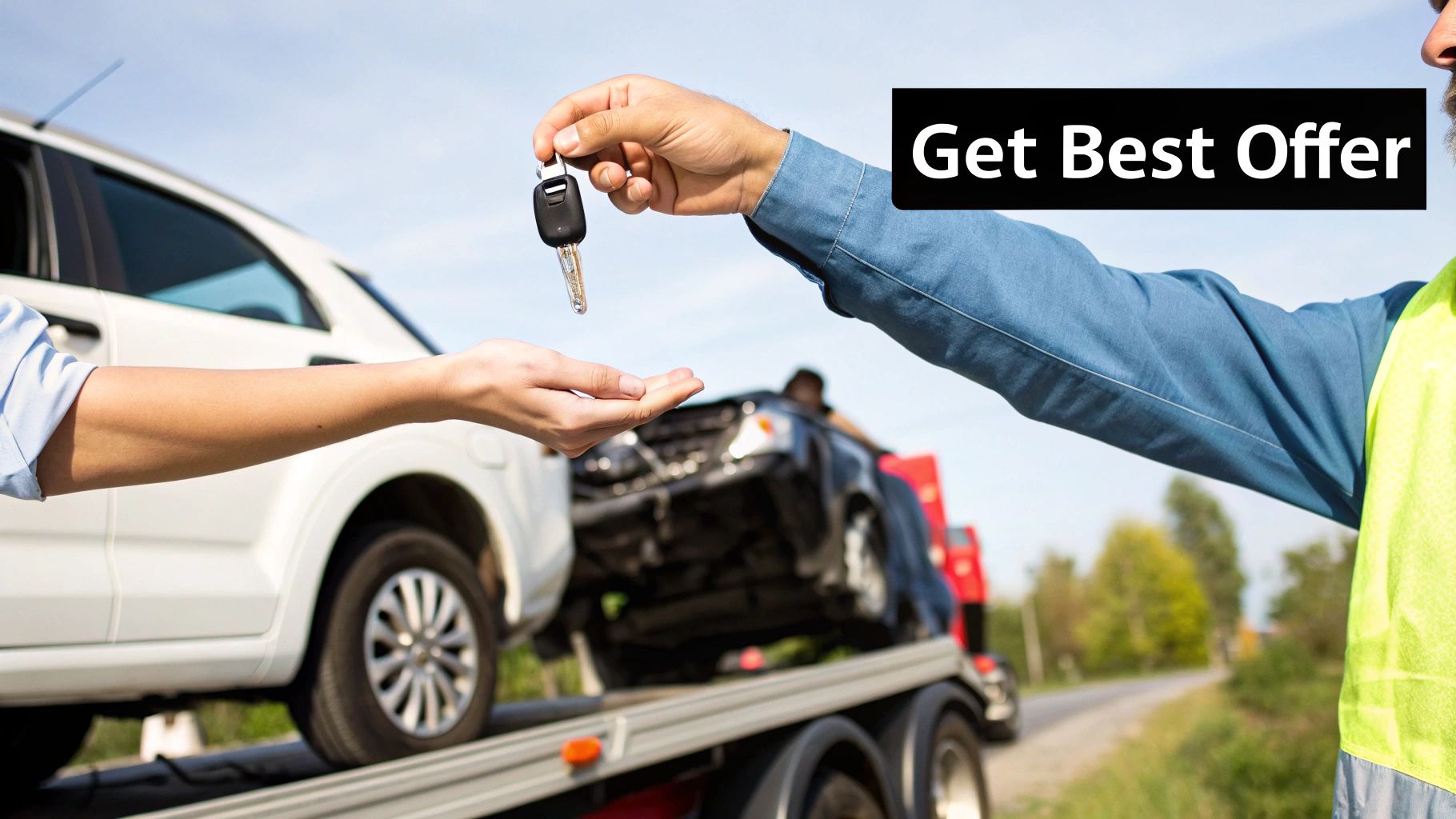
Alright, you’ve done the hard yards, and now it’s time to seal the deal. This last part involves a bit of paperwork, but don't let that put you off. It's actually much simpler than selling privately and is your key to a clean, worry-free sale.
Getting the paperwork right is non-negotiable. It’s what officially gets the car out of your name and protects you from any headaches down the track, like someone else’s parking fines showing up in your mailbox.
What to Have Ready for the Tow Truck Driver
When the tow truck arrives to collect your car, they'll need to verify a couple of things to make sure everything is above board. It’s a good idea to have these items handy to keep the process moving smoothly.
- Proof of Ownership: This is usually your car's registration certificate. If you can't find it, the original purchase receipt can sometimes work too. This just proves you have the legal right to sell the vehicle.
- Valid Photo ID: A driver's licence or proof of age card is perfect. The wrecker just needs to confirm that you are who you say you are.
Once the driver arrives, they'll give the car a quick once-over to ensure it matches the description you gave them. If all is good, they’ll hand over the cash, and you'll sign a receipt for the payment.
Your most important job here is to lodge a Notice of Disposal. This is a simple form that you submit to your state's transport authority (like VicRoads or Transport for NSW). It officially tells them you've sold the car, which is crucial. If you skip this, you could still be held liable for any fines or tolls linked to the vehicle.
The Final Step: Making it Official
With the car towed away and the cash in your pocket, there's just one last thing to tick off your list: lodging that Notice of Disposal.
Thankfully, most states have made this super easy. You can usually jump online and get it done in about five minutes. This is the final action that closes the loop, giving you complete peace of mind that the sale is done and dusted.
What Really Happens at the Wrecking Yard
Ever wondered what actually goes on after that tow truck hauls your old car away? It’s not the end of the road. Selling your car to a wrecker kicks off a fascinating and surprisingly eco-friendly recycling process. Modern wrecking yards are far from the old-school junkyards you might picture; they're sophisticated dismantling operations.
The very first job is to make the car environmentally safe. A technician gets to work draining all the fluids – engine oil, coolant, leftover petrol, brake fluid, the lot. These hazardous materials are carefully collected and sent off for proper disposal or recycling, which stops them from ever seeping into the ground.
From Car to Catalogue
Once the car is clean and safe, the real work begins. This is where the expertise of the mechanics comes in. They go through the vehicle with a fine-toothed comb, identifying and removing all the parts that are still in good nick and in demand.
They're usually on the lookout for high-value components like:
- Engines and transmissions that still run well
- Alternators, starter motors, and other key electrical parts
- Body panels like doors, bonnets, and guards that are straight and rust-free
- Headlights, taillights, and mirrors without cracks or damage
Every salvaged part gets a thorough check, a good clean, and is then catalogued and added to the inventory. This is a huge win for other drivers, who can get their hands on quality, affordable spare parts. If you want to dive deeper into this first stage, our guide on how to scrap a car properly breaks it all down.
When you sell your car to a wrecker, you're doing more than just getting cash for a clunker. You’re playing a part in the circular economy by giving those parts a second life and reducing the environmental toll of manufacturing brand-new ones.
So, what’s left after all the good bits have been stripped? Just the empty metal shell. This bare frame is then crushed down into a compact cube and sent on its final journey to a metal recycling facility. It’s a sustainable end, too. These days, more than 80% of a car's weight is recyclable metal. You can read more about the future of auto wrecking on waautowreckers.com.au.
Still Have a Few Questions?
Even with the process laid out, a few common "what ifs" tend to pop up when you're on the verge of calling a wrecker. I've heard them all over the years, so let's clear up the most frequent ones to make sure you're going into this with total confidence.
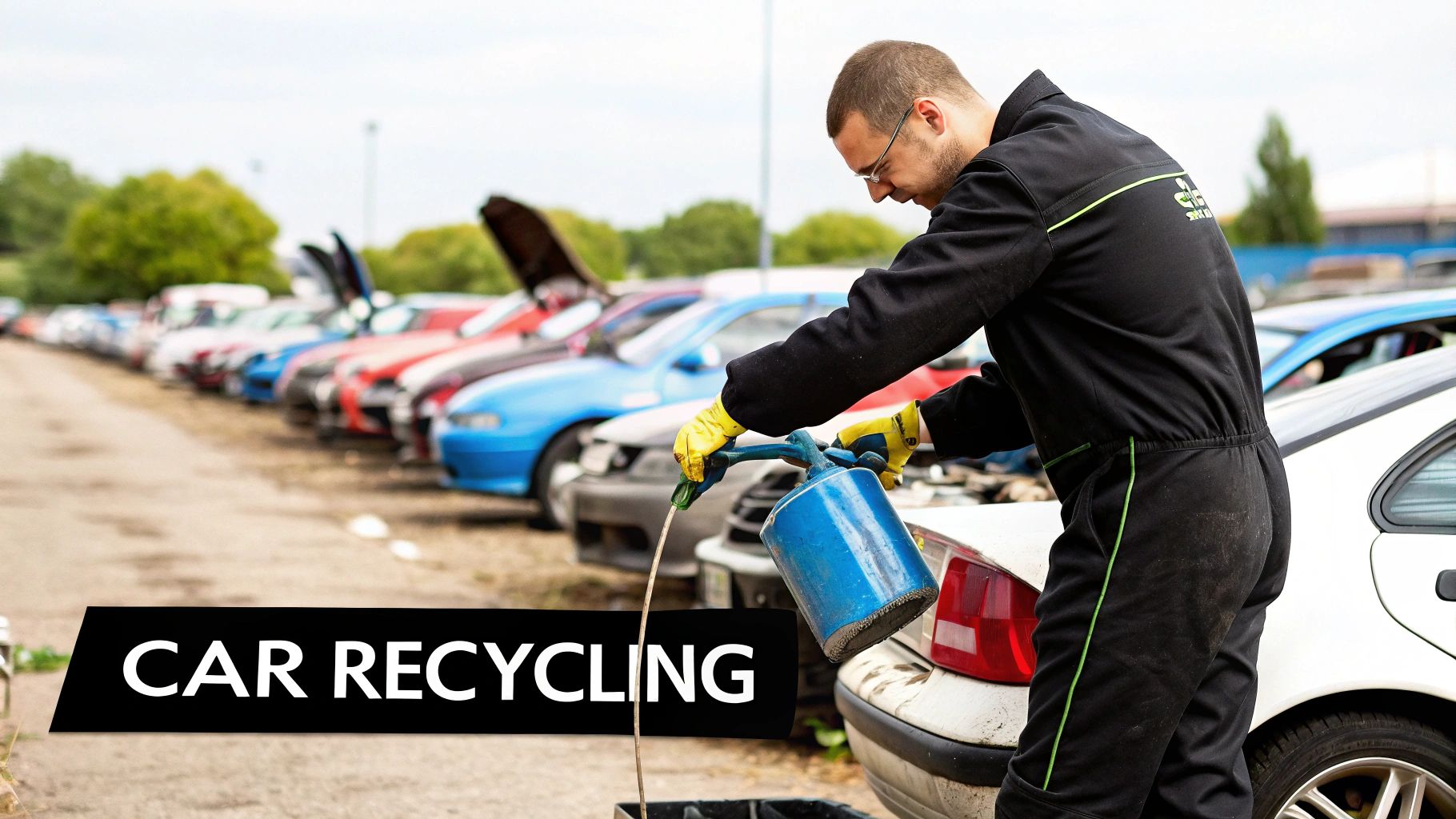
Missing paperwork is a common worry, but it’s usually not the roadblock you might think it is.
What if I Can't Find My Rego Papers?
This is a big one. While having the current registration or title papers is the most straightforward route, don't panic if you can't find them. You can still sell the car.
What you will need is some other form of proof of ownership. This could be an old registration certificate or a bill of sale from when you bought it. Paired with your photo ID, this is often enough for most wreckers. The key is to be upfront about it when you call for a quote—just ask them what they require.
Does My Car Need to Be Drivable… or Even Roll?
Another classic question. People often assume that if the car is a complete non-runner, stuck in gear, or has flat tyres, it's a bigger problem. It isn't.
The short answer is no. Wreckers specialise in end-of-life vehicles and will have a tow truck ready to handle cars in any condition, whether they've been in an accident or simply won't start.
Remember, they're not buying it to drive it. The value is in the weight of the scrap metal and the individual parts they can salvage, so its ability to move under its own power is irrelevant.
How Long Does This Whole Thing Actually Take?
This is where selling to a wrecker really shines. One of the main reasons people choose this option is the sheer speed.
From that first phone call to getting a firm quote and locking in a pickup time, the whole deal can often be sorted in less than 24 hours. When the tow truck arrives, the actual removal and payment are usually done and dusted in under 30 minutes. It’s one of the most efficient ways to deal with an unwanted vehicle.
Ready to turn that old car into instant cash without the hassle? The team at Auto Removal Adelaide offers free, same-day removal across Adelaide and pays top dollar on the spot. Get your free, no-obligation quote today.

